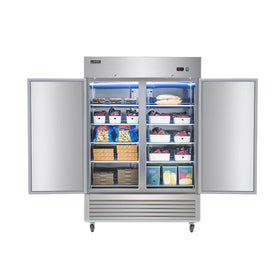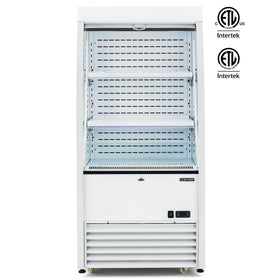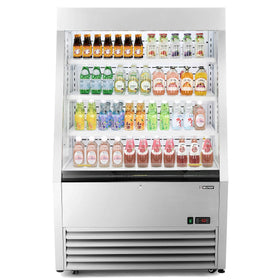How long beans last in the fridge varies depending on the type of beans (green beans, black, etc), whether it fresh, dried, cooked ( baked, refried, boiled), raw, or canned.
Most types of cooked beans (refried, baked, boiled, etc) last about 3-5 days in the fridge. Raw beans last slightly longer (5-7 days), and canned beans last longest, 1-2 years if unopened.
Remember to let cooked beans cool to room temperature before refrigerating. Store in an airtight container, and use sealed containers to prevent drying out and absorbing odors.
1. How Long Do Fresh/Uncooked Beans Last in the Fridge?
Fresh Green Beans, Wax Beans, String Beans
Raw beans (including green beans, wax beans, and string beans) can last about 5–7 days in the fridge if unwashed and stored in a bag or container.
However, once beans have been soaked, they must be cooked within 24 hours. Soaked beans will go bad even if put in the fridge.
If blanched before freezing, these types of raw beans can last up to 10-12 months in the freezer.
Fresh Shell Beans
Fresh Shell beans, including the fava, lima, cranberry, and edamame varieties, all last about 3-5 days in the fridge.
If frozen, they can last up to 8-10 months in the fridge.
2. How Long Do Cooked Beans Last in The Fridge?
Black beans, pinto beans, kidney beans, navy beans, and chickpeas/garbanzos all last the same duration in the fridge once cooked. Here’s how long you can expect your cooked beans to last in the fridge:
- Cooked with plain seasoning:3-5 days
- Boiled and unseasoned: 4-5 days in the fridge. May last longer if stored in their cooking liquid.
- Frozen cooked beans: 2-3 months for best quality
Homemade Beans
Homemade beans generally last about 3-5 days in the fridge, and up to 2-3 months in the freezer.
- Take note that homemade beans that have been slow-cooked, pressure-cooked, or seasoned still last the same amount of time in the fridge: 3-5 days
- However, if the recipe includes meat (like ham or bacon), it is best to eat it earlier, closer to the 3-day mark.
3. Refried Beans
Refried beans can last 3-4 days in the fridge, and about 2 months in the freezer. To ensure that it lasts long in the fridge, store it in an airtight container rather than the original can it comes in.
4. Baked Beans
Baked beans contains sugar, so it tends to spoil faster than plain cooked beans. It lasts 3-4 days in the fridge, and about 2 months in the freezer. For baked beans, it is not advised to eat after 4 days in the fridge.
5. Canned Beans
Canned beans are a convenience food with long shelf stability when unopened:
- Unopened: 1–2 years shelf-stable (always check the “best by” date).
- Opened: Transfer leftovers into an airtight container. They last 3–4 days in the fridge or up to 2 months in the freezer.
Never store beans in the can after opening — the metal can affect taste and quality.
How Long Do Beans Last in The Fridge?
| Bean Type / Dish | Fridge (Airtight Container) | Freezer (Best Quality) |
| Fresh green beans (raw) | 5–7 days | 10–12 months (blanched) |
| Fresh green beans (cooked) | 3–4 days | 10–12 months |
| Fresh shell beans (fava, lima, edamame) | 3–5 days raw / 3–4 days cooked | 8–10 months |
| Cooked dried beans (black, pinto, kidney, navy, chickpeas) | 3–5 days | 2–3 months |
| Boiled beans (plain) | 4–5 days | 3 months |
| Homemade seasoned beans | 3–5 days | 2–3 months |
| Refried beans | 3–4 days | 2 months |
| Baked beans | 3–4 days | 2 months |
| Canned beans (unopened) | 1–2 years (shelf-stable) | — |
| Canned beans (opened) | 3–4 days | 2 months |
How to Tell if Your Beans Have Gone Bad
Even when you are within the typical storage window, beans can sometimes spoil faster depending on how it stored, the temperature it is kept in, and whether they have been exposed to temperature or moisture. Here’s how you know your beans have gone bad:
- Smell: Any sour, rancid, or unusual odor means it’s time to toss them.
- Appearance: Mold (white, green, or fuzzy spots) or a slimy surface is a clear indicator.
- Texture: Slimy or sticky beans, or beans that have broken down into mush when they weren’t originally, are no longer good.
- Taste (last resort): If something tastes off, don’t risk it.
Important: Don’t scrape off mold and try to eat the rest. Mold spores can spread invisibly through beans and sauces.
Storage Tips for Storing Beans in the Fridge
- Always cool your beans quickly before refrigerating. Hot food in the fridge creates condensation, and that encourages bacteria.
- Always use shallow, airtight containers when storing beans. Beans last longer when stored in a way that allows them to cool evenly.
- If freezing, always freeze beans in portions. Add a little cooking liquid or sauce to beans before freezing to keep them from drying out.
- Label and date the containers you store your beans in. Labelling and freezing are essential, especially for frozen beans, so you know how long they’ve been stored.
Best Refrigerators for Storing Beans
For Storing Beans at Home
Look for refrigerators with reliable temperature control, humidity drawers, and adjustable shelving. Energy-efficient models are ideal for keeping beans fresh while saving on electricity.
For Business/Restaurants Storing Beans
Commercial refrigerators are the better choice since they offer consistent cooling, strong airflow, and durability for frequent use. They also provide larger storage capacity, which is essential when handling bulk beans.
- Consider a reach refrigerator/ freezer for storing fresh or cooked beans.
- For canned beans on sale, a commercial display refrigerator will do.
Conclusion
In general, cooked beans stay good for 3-5 days when kept in an airtight container, canned beans can stay in the fridge for years if unopened, while uncooked, soaked beans should be used within 24 hours.
Always check for signs of spoilage, such as sour smells, sliminess, or mold, before eating. By storing beans correctly and keeping track of their shelf life, you’ll reduce waste, keep your meals safe, and get the best flavor and nutrition out of every batch.
Explore more storage guides, including how to store strawberries in the fridge and how long coffee stays in the fridge.










